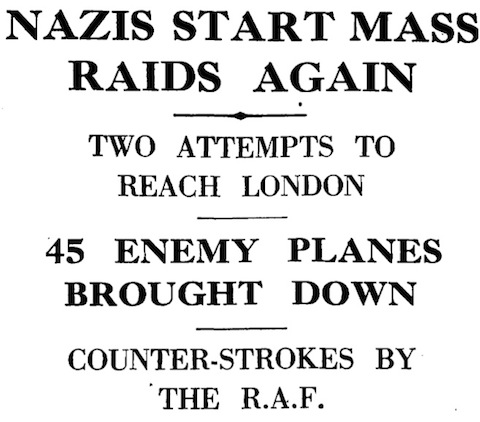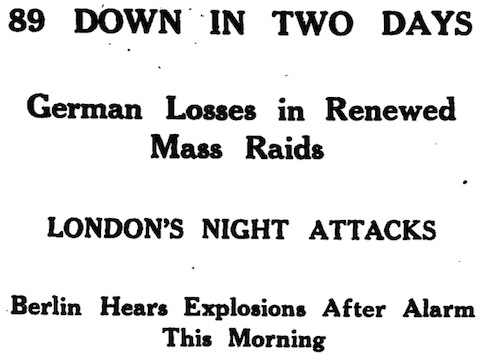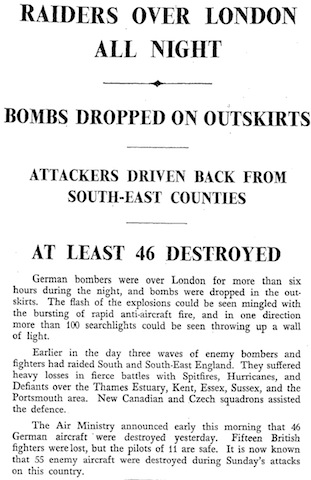
Interestingly, after yesterday’s coordinated pro-bombing campaign, today’s headlines in The Times (4) emphasise the efforts of Bomber Command over those of Fighter Command. In particular, a raid on Berlin on Wednesday night (or Thursday morning) is described in some detail. A ‘large number of bombs, high explosive and incendiary’ were dropped ‘on a series of carefully selected military objectives and on works vital to war production’, including a power station and railway yards. A pair of squadrons made a ‘special attack’ on an (unspecified) objective just four miles from Berlin’s centre. A number of the aircrew (all of whom returned safely) gave accounts of the mission, including this ‘young pilot officer’:
We bombed at 24.00 hours — dead on midnight (he said). Somebody had been there before us. When we arrived we found the target well on fire. We could see it when we were 25 minutes’ flying time away from the target. We came in more or less North to South and put our stick of bombs down just to the left of this big fire. Then four more fires started. They were burning with very bright white lights. Altogether we were cruising round over Berlin for about half an hour.
But for all that, there are many more articles relating to the bombing of Britain. The problem is not the daylight raids, all of which were turned back or broken up yesterday (although the Scilly Isles were bombed and machine-gunned again). Instead it’s the night raids which are starting to have an adverse effect on the civilian population. Nearly a dozen towns (unnamed by The Times, no doubt due to the censor) in the Midlands and the north-west of England were bombed night before last, causing little damage. For example, one coastal town sustained damage to ‘residential property, a church, a garage, and a sports field’, but considering the number of bombs dropped ‘the damage was not extensive’.
More attention is given to London’s ‘night ordeals’ (2). Again, the problem is not so much the physical damage caused by bombing — most of the many incendiaries which fell on Wednesday night were quickly put out by efficient civil defence personnel — but the loss of sleep caused by the sounds of sirens, aircraft, bombs and guns.
Dawn over London yesterday found many a citizen just going to bed. Sirens had sounded at 9 o’clock on the night before, and for seven hours German raiders were over the London area. It was the longest air raid warning yet experienced in London.
‘Suburban London is meeting these nightly ordeals with fortitude’, by ‘adapting its home life to this disturbing aspect of total warfare’. For examples, Anderson shelters are being kitted up with camp beds, and people are learning to grab sleep when they can. Parents are being advised that sleep is particularly important for school-aged children. One London headmaster has written to his boys’ parents advising that they be sent to bed early rather than letting them sleep in in the mornings: ‘Their education must be carried on, in their own and the national interest, as normally as circumstances permit.’ The disruption to sleep patterns ‘may be one of the objects of the enemy in making this type of raid’ — that is to say, single aircraft dropping bombs at random intervals. A separate article on page 9 makes this point again, quoting an Air Ministry official:
The [German] bombers mostly flew at a very great height and dropped their bombs at scattered points with no apparent plan. It can only be assumed that the object is to terrorize the civil population, and Londoners are best able to judge for themselves how completely these attempts fail.
Of course, the official added, such ‘purposeless and ineffective raids’ are completely unlike the ‘methodical and sustained offensive’ being carried out by the RAF against Germany, ‘confined to carefully planned attacks on military objectives and is known to be achieving valuable results’.
But aimless though the raids may be, they are leading to complaints from local governments about the apparently equally aimless raid warning system. The Ministry of Home Security has issued a pamphlet explaining the various alerts: yellow is a confidential warning to civil defences that they should take necessary precautions; purple means that any ‘exposed lighting in factories, dockyards and the like should be extinguished immediately; red is the public warning and means that the warning sirens should be sounded immediately; and white is the all-clear, leading to the ‘raiders passed’ siren where warnings have been sounded. The problem is that in some cases false alarms are being given — sirens go off and yet no bombers appear — but in others no warning is given before the bombs start to fall. The ARP committees for Birmingham, Swansea and Croydon have all approached the government to request that the raid warning system be reformed or clarified, though what they have in mind is not specified. Allowing towns to have their own warning systems is not the answer, according to the Ministry, because of the ‘speed of modern aircraft, the possibility of the enemy changing his direction, and the difficulty of distinguishing locally between friend and foe’. This would lead to an increase in false alarms and a few raiders could cause ‘several million people [to] lose sleep and rest and be unfit for duty next day’. In other words, this would be ‘to play the enemy’s game’.
![]() This work is licensed under a Creative Commons Attribution-NonCommercial-NoDerivatives 4.0 International License.
Permissions beyond the scope of this license may be available at http://airminded.org/copyright/.
This work is licensed under a Creative Commons Attribution-NonCommercial-NoDerivatives 4.0 International License.
Permissions beyond the scope of this license may be available at http://airminded.org/copyright/.




Pingback: Airminded · Saturday, 31 August 1940